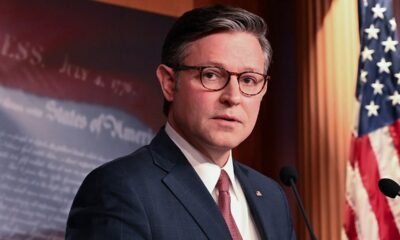INTERNACIONAL
REAL ID sees nationwide state government compliance ahead of deadline, but it wasn’t always that way

While all 50 states, the District of Columbia and U.S. territories are all currently in compliance ahead of the federal deadline of May 7, REAL ID was once roundly opposed by several state governments.
As soon as two years after the law’s 2005 passage by President George W. Bush, several state leaders had already expressed objections to complying with the nationwide standard.
Then-Montana Gov. Brian Schweitzer, a Democrat, called REAL ID a «harebrained scheme» in a 2008 NPR interview.
«[W]e are putting up with the federal government on so many fronts, and nearly every month they come out with another… unfunded mandate to tell us that our life is going to be better if we’ll just buckle under on some other kind of rule or regulation,» Schweitzer said.
NO ‘REAL ID’ APPOINTMENTS OPEN IN NEW JERSEY AS RESIDENTS SOUND OFF: ‘GET WITH THE TIMES, NJ’
REAL ID enforcement is set to take effect on May 7. (Getty Images)
«And we usually just play along for a while, we ignore them for as long as we can, and we try not to bring it to a head. But if it comes to a head, we found that it’s best to just tell them to go to hell and run the state the way you want to run your state.»
One year prior, Schweitzer signed a law banning Montana’s DMV from enforcing REAL ID stipulations, calling it a «threat to privacy» in a letter to then-Colorado Gov. Bill Ritter, also a Democrat.
Not too far west in Washington state, fellow Democratic Gov. Christine Gregoire signed similar legislation that required the feds to appropriate $250 million to cover the unfunded mandate.
«[E]ven worse, it doesn’t protect the privacy of the citizens of Washington,» Gregoire claimed when signing the bill.
On the Republican side, then-Pennsylvania Gov. Tom Corbett signed a law in 2008 halting PennDOT’s implementation of REAL ID.
«Neither the governor nor the Department of Transportation or any other Commonwealth agency shall participate in the REAL ID Act of 2005 or regulations promulgated thereunder,» Act 38’s text read.
The policy was later reversed by Act 3 of 2017, signed by Democratic Gov. Tom Wolf.
‘MASS SURVEILLANCE’: CONSERVATIVES SOUND ALARM OVER TRUMP ADMIN’S REAL ID ROLLOUT
Meanwhile, New Jersey has the lowest reported compliance with REAL ID, according to a CBS News analysis, with only 17% of the population having one – and many complaining of not enough bandwidth for the state to handle the number of applications.
On Wednesday, Kentucky Republican state Sen. Jimmy Higdon, wrote to DHS asking for an extension to the May 7 enforcement date, according to the Lexington Herald-Leader.
State compliance with REAL ID means that a state has met the federal security standards outlined by DHS for the actual issuance of drivers’ licenses. Since all states have done so, they are considered compliant.
Because the program is optional for the licenseholder – due to the alternatives, like passports – an insufficient proportion of residents not having REAL IDs does not affect statistical state compliance.
REAL ID requirements, endeavored out of a post-9/11 national security law from then-Rep. James Sensenbrenner, R-Wis., dictate that the Transportation Security Administration (TSA) will no longer accept a photo-ID that does not have a star in the upper corner denoting verification, unless it is a passport.
To become verified, Americans must provide Social Security information or other personal identifiers.
CLICK HERE TO GET THE FOX NEWS APP
The law’s implementation date has been delayed several times, due to COVID and concerns about varied state compliance and states’ abilities to summon the necessary resources to meet federal standards.
Fox News Digital reached out for comment from the current governors of the three states referenced: Democrat Bob Ferguson of Washington, Republican Greg Gianforte of Montana and Democrat Josh Shapiro of Pennsylvania.
Politics,Homeland Security,Washington,Montana,Pennsylvania,Governors
INTERNACIONAL
Speaker Johnson hit with Democrat-led lawsuit over delayed swearing-in amid House shutdown chaos
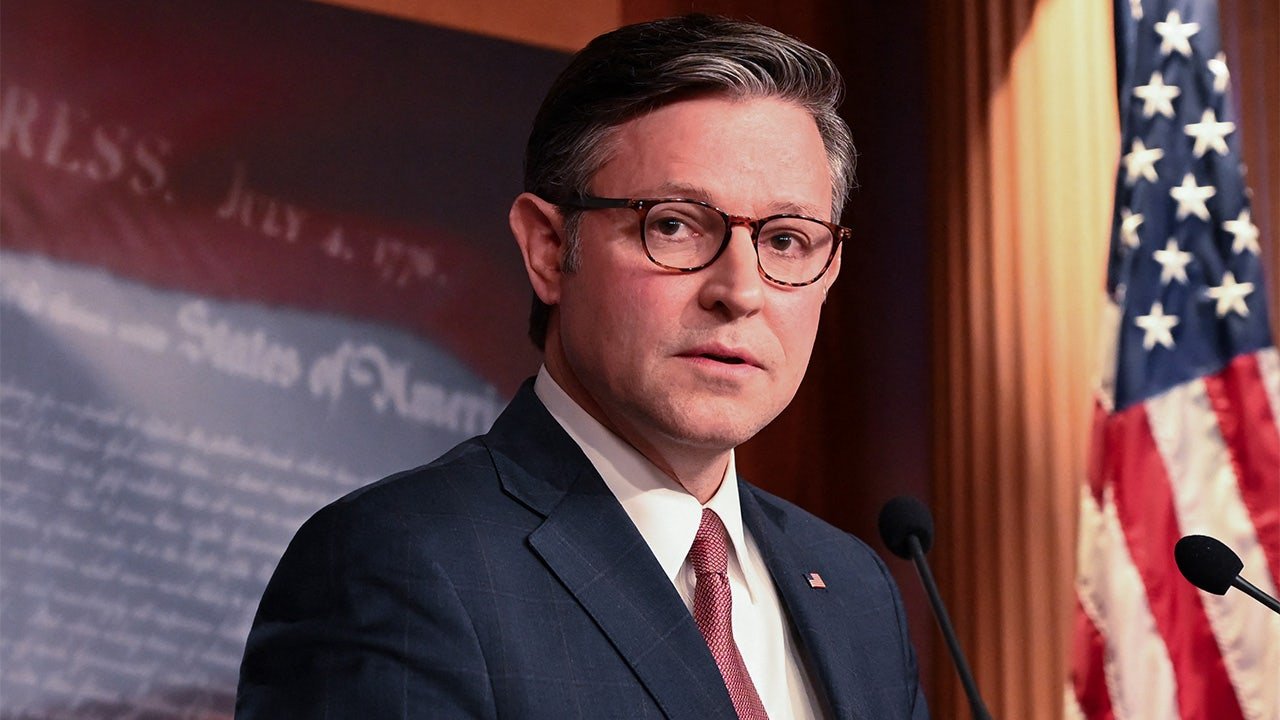
NEWYou can now listen to Fox News articles!
The state of Arizona is suing Speaker Mike Johnson, R-La., over the delayed swearing-in of Rep.-elect Adelita Grijalva, D-Ariz.
«Speaker Mike Johnson is actively stripping the people of Arizona of one of their seats in Congress and disenfranchising the voters of Arizona’s seventh Congressional district in the process,» Arizona Attorney General Kris Mayes, a Democrat, said in a statement.
«By blocking Adelita Grijalva from taking her rightful oath of office, he is subjecting Arizona’s seventh Congressional district to taxation without representation. I will not allow Arizonans to be silenced or treated as second-class citizens in their own democracy.»
Johnson dismissed the lawsuit as a bid to get «national publicity» in comments to reporters earlier this week and on Tuesday evening.
BATTLEGROUND REPUBLICANS HOLD THE LINE AS JOHNSON PRESSURES DEMS ON SHUTDOWN
Speaker of the House Mike Johnson speaks during a news conference at the U.S. Capitol on the tenth day of the federal government shutdown on Oct. 10, 2025, in Washington, D.C. (Alex Wroblewski/AFP via Getty Images)
«I think it’s patently absurd. We run the House. She has no jurisdiction. We’re following the precedent,» Johnson said in response to the state attorney general. «She’s looking for national publicity, apparently she’s gotten some of it, but good luck with that.»
Grijalva won a special election on Sept. 23 to replace her father, late Rep. Raul Grijalva, D-Ariz., after he passed away from cancer at age 77.
Johnson has repeatedly said that Grijalva will be sworn into office when the House returns to its regular sessions. But it’s not clear when exactly that will be — the House GOP leader has threatened to keep his lawmakers out of Washington, D.C., until the ongoing government shutdown is over.
It’s a bid to pressure Senate Democrats, led by Minority Leader Chuck Schumer, D-N.Y., to agree to the GOP’s plan to fund the federal government through Nov. 21.
But Schumer and his allies have resisted thus far, sinking the Republican-led bill 11 times and keeping the shutdown going for 21 days.
House Democrats have accused Johnson of playing politics and depriving Arizona’s 7th Congressional District of representation in the process.
«Republicans on vacation for four weeks — and one of the consequences of that is that Republicans have refused, now for four consecutive weeks, to swear in Representative-elect Adelita Grijalva, depriving hundreds of thousands of people in the state of Arizona of the representation that they deserve, particularly during this challenging moment in the country,» House Minority Leader Hakeem Jeffries, D-N.Y., said during a press conference on Tuesday.
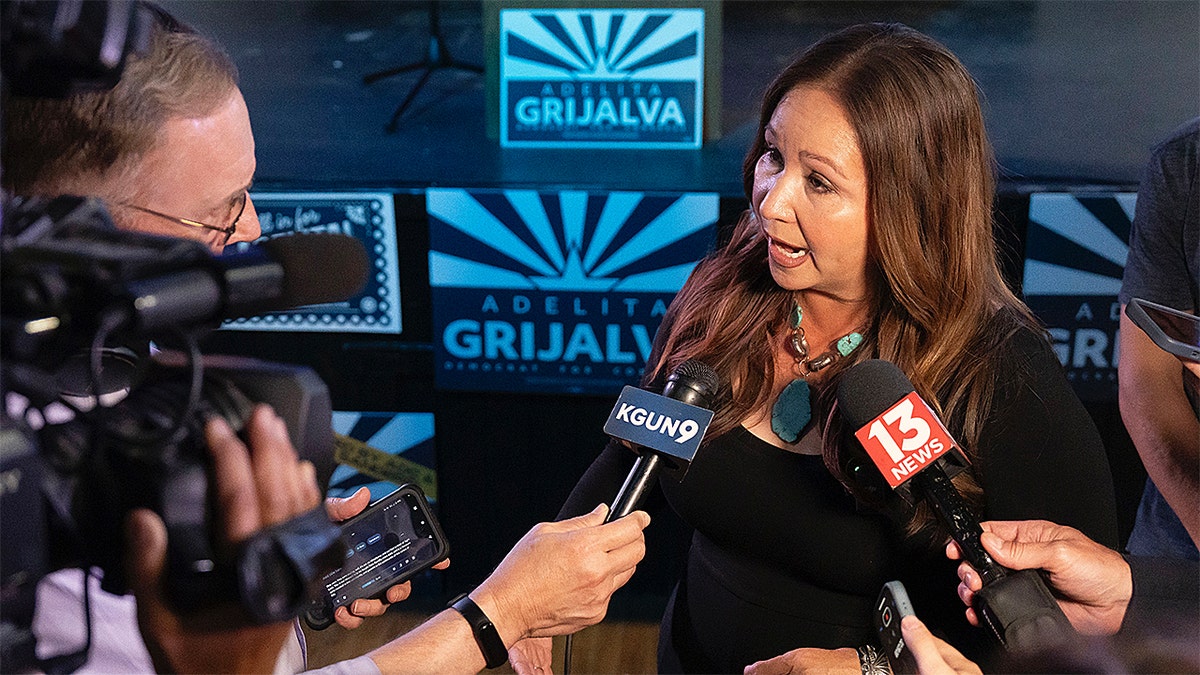
Rep.-elect Adelita Grijalva is interviewed in Tucson, Arizona, on July 15, 2025 (Rebecca Noble/Getty Images)
Johnson, in response to Democrats’ criticism, has repeatedly pointed out that the House was not in session when Grijalva won her election.
He’s also argued that he was following precedent set by former Speaker Nancy Pelosi, D-Calif., who waited 25 days to swear in Rep. Julia Letlow, R-La., in 2021.
Letlow had won a special election to replace her husband, Rep.-elect Luke Letlow, R-La., who died during the COVID-19 pandemic before he could be sworn into office in January 2021.
«We are not in legislative session. The chronology is important. Rep. Grijalva won her race, I think it was the last week of September, after we had already gone out of session. So I will administer the oath to her, I hope, on the first day we come back,» Johnson said.
58 HOUSE DEMS VOTE AGAINST RESOLUTION HONORING ‘LIFE AND LEGACY’ OF CHARLIE KIRK
«I’m willing and anxious to do that. In the meantime, instead of doing TikTok videos, she should be serving her constituents.»
Grijalva has argued she cannot perform her legislative or constituent duties without being sworn in first, which Johnson and Republicans have disputed.
But her swearing-in is also key to the ongoing battle over Jeffrey Epstein documents going on in the House.
Once made a member of Congress, Grijalva is expected to be the deciding signature on a measure aimed at forcing a House-wide vote on releasing Epstein documents in the Department of Justice’s (DOJ) possession.
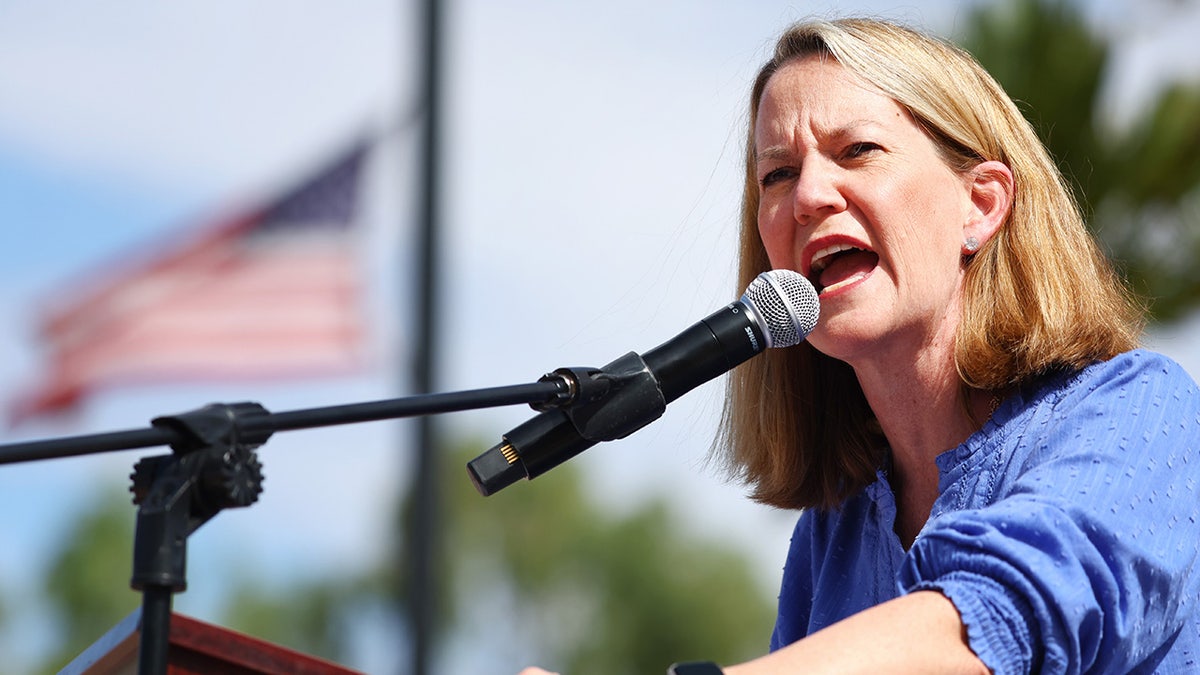
Arizona Attorney General Kris Mayes, then a Democratic candidate for her role, speaks at a Women’s March rally outside the State Capitol on Oct. 8, 2022 in Phoenix, Arizona. (Mario Tama/Getty Images)
CLICK HERE TO GET THE FOX NEWS APP
The measure, called a discharge petition, is designed to end-run House leaders on specific legislation — provided it has a majority of lawmakers’ signatures.
Johnson and House GOP leaders have called the measure superfluous and political, pointing to the chamber’s own ongoing investigation and procedures aimed at widening transparency into Epstein’s case.
However, the speaker has signaled he would not block the measure if it came to the House floor when Grijalva was sworn in.
Fox News Digital reached out to Johnson for a response but did not immediately hear back.
house of representatives politics,democrats,politics,mike johnson,arizona
INTERNACIONAL
Estado de emergencia en Perú: cuáles son las fuertes restricciones que paralizarán Lima y Callao por un mes
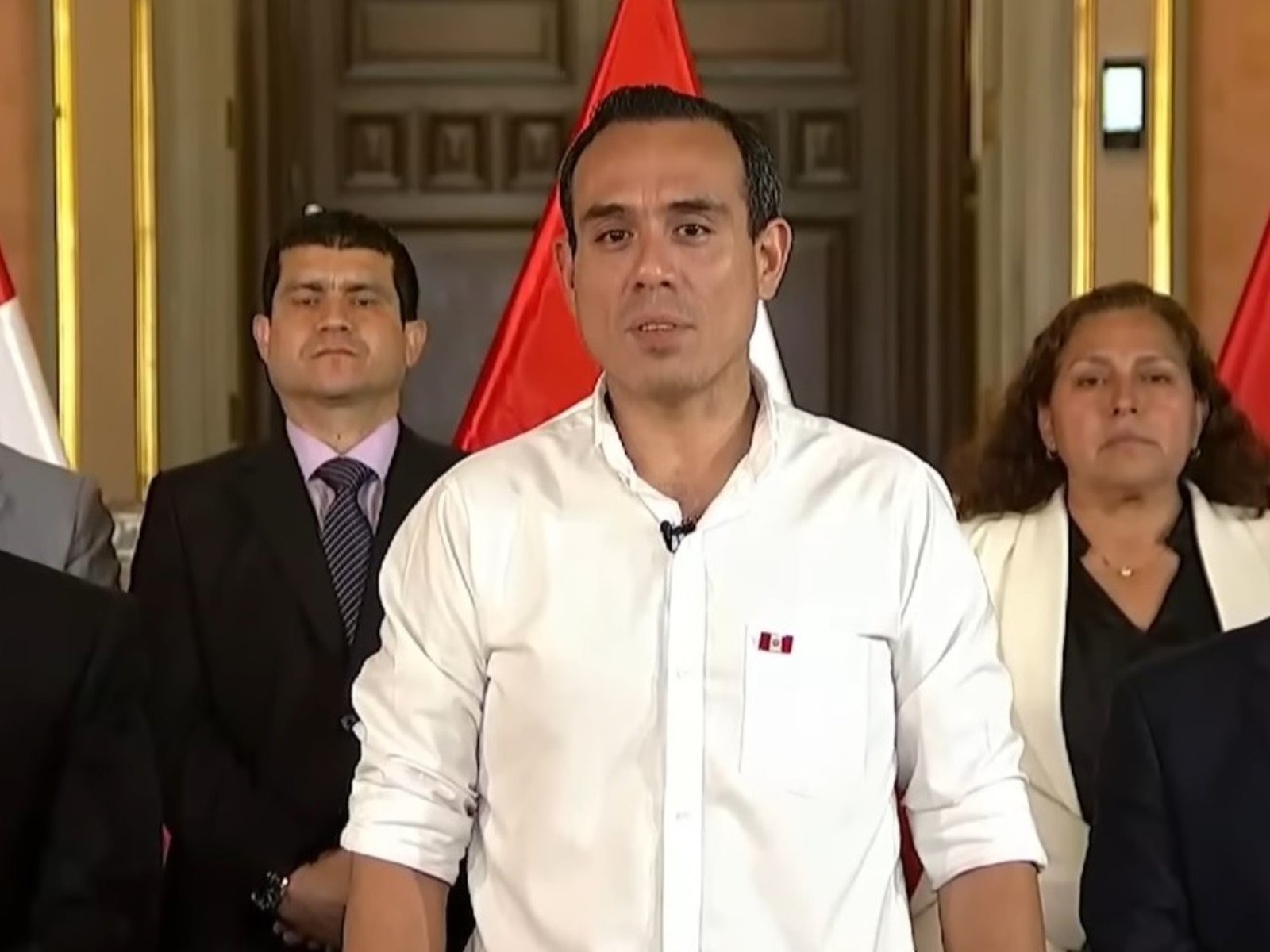
Lima quedará paralizada por un mes luego de que el presidente de Perú, José Jerí, decretara el estado de emergencia para enfrentar la ola de violencia, lo que implicó la suspensión temporal de algunos derechos constitucionales a partir de este miércoles. La medida también alcanza a la ciudad portuaria de Callao y afectará a más de 10 millones de personas.
Según el decreto publicado en el diario oficial El Peruano, mientras dure la medida quedan suspendidos derechos fundamentales como la inviolabilidad del domicilio y la libertad de reunión, en un contexto de múltiples protestas contra el Gobierno y el Congreso por diversos motivos, entre ellos la inseguridad.
Las nuevas normas permiten que las fuerzas de seguridad ingresen a cualquier vivienda y detengan a sospechosos dentro o fuera del domicilio sin orden judicial, y prohíben que la población se reúna para manifestaciones sin autorización de las autoridades.
También contempla que las Fuerzas Armadas apoyen a la Policía Nacional en el combate al crimen organizado mediante patrullas en zonas críticas, como paraderos, estaciones de metro e instituciones asociadas, y en otras situaciones de violencia.
Policías y militares custodiarán dependencias públicas e instalarán comandos temporales en coordinación con los municipios más afectados, con operativos de decomiso de armas, municiones, explosivos ilegales y artefactos pirotécnicos.
El estado de emergencia establece además restricciones en las cárceles, limitando las visitas a los internos, aplicando apagones en las celdas que permiten únicamente la iluminación y eliminando las antenas telefónicas ilegales en los alrededores.
En cuanto al tránsito, se prohíbe que dos adultos viajen en la misma moto, y las autoridades podrán solicitar documentos de identidad en las calles e incluso ingresar por la fuerza a viviendas.
El Comité de Fiscalización llevará a cabo operativos de control con apoyo de las fuerzas combinadas en áreas donde se identifiquen casos de trata de personas, venta ilegal de drogas y armas.
Las mismas medidas se aplicarán a la venta informal de chips telefónicos y equipos celulares de dudosa procedencia, suspendiendo de inmediato las líneas vinculadas a extorsiones o secuestros, según la ley vigente.
En un mensaje televisado de apenas un minuto a las 20:30 (hora local), Jerí afirmó: «La delincuencia ha crecido de manera desmesurada en los últimos años, causando un enorme dolor en miles de familias y afectando el progreso del país. Pero esto ¡se acabó!«.
Agregó que «el estado de emergencia aprobado por el Consejo de Ministros entra en vigencia a las 00 horas y por 30 días en Lima Metropolitana y el Callao», y subrayó que el gobierno pasa «de la defensiva a la ofensiva en la lucha contra el crimen, recuperando la paz, la tranquilidad y la confianza de millones de peruanos».
«Las guerras se ganan con acciones, no con palabras. ¡Viva Perú!», concluyó.
La medida es la primera acción de envergadura que toma Jerí en casi dos semanas al frente del país, donde la inseguridad es una de las principales preocupaciones de la población.
El Presidente no aclaró si pedirá al Parlamento derogar seis leyes aprobadas mientras fue legislador, consideradas por expertos como obstáculos para combatir el crimen, ya que eliminan la detención preliminar sin flagrancia, dificultan procesar partidos políticos como grupos criminales, elevan requisitos para confiscar bienes y entorpecen allanamientos y cooperación eficaz.
Jerí asumió la presidencia el 10 de octubre tras la destitución de Dina Boluarte por el Congreso, luego de un desplome en su aprobación.
Durante una multitudinaria protesta la semana pasada, que dejó un muerto en enfrentamientos con la policía, los manifestantes exigieron la renuncia del mandatario, la disolución del Parlamento y la derogación del paquete de leyes que, según expertos, debilitó la lucha contra la delincuencia.
Video
Incidentes durante una protesta frente al Congreso en Perú
Perú registra un marcado aumento de los delitos en los últimos años, con la mayoría de víctimas de la clase trabajadora: los homicidios pasaron de 676 en 2017 a 2.082 en 2024, mientras que las denuncias por extorsión subieron de 2.305 en 2020 a 21.746 el año pasado, según datos de la fiscalía.
El gobierno de Boluarte había declarado un estado de excepción en marzo, que se extendió hasta mayo, medida criticada por su escasa eficacia frente a los grupos criminales.
INTERNACIONAL
Tensión en Colombia: un tribunal dejó sin efecto la condena contra Álvaro Uribe por soborno y fraude procesal
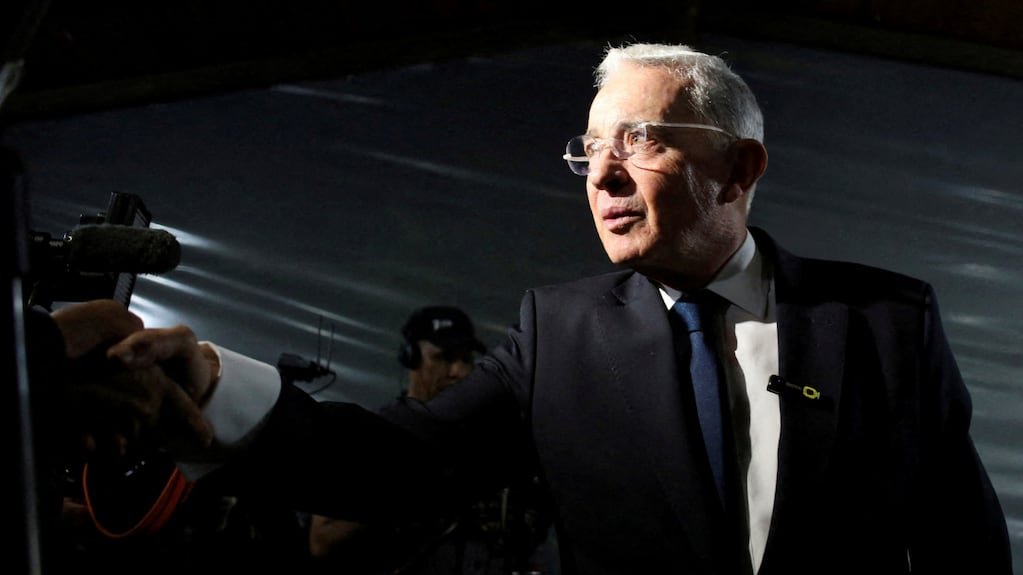
El Tribunal Superior de Bogotá dejó sin efecto este martes la condena que pesaba contra el expresidente colombiano Álvaro Uribe. Lo absolvió de los delitos de soborno a testigos y fraude procesal por los que había sido condenado en primera instancia a 12 años de arresto domiciliario.
“He dicho la verdad a mis compatriotas a lo largo de esta extensa vida pública”, dijo Uribe a la prensa desde su natal Antioquia, en el noroeste del país. Fue una breve declaración en la que agradeció a Dios, a su familia y a los abogados. Además, aseguró que continuará trabajando por Colombia.
Leé también: Trump suspendió su cumbre con Putin y presiona a Zelenski para que le ceda una región de Ucrania a Rusia Álvaro Uribe, en una rueda de prensa posterior a conocerse la decisión que lo absolvió de una condena de 12 años de cárcel domiciliaria. (Foto: REUTERS/Juan David Duque).
La argumentación del tribunal a favor de Álvaro Uribe
Uribe, quien gobernó Colombia entre 2002 y 2010, defendió su inocencia en el primer juicio contra un expresidente en el país. Además de esto, tildó la condena de “persecución política”, asegurando que la jueza fue sesgada en su contra. Sus abogados apelaron cuestionando la validez de las pruebas.
“La motivación de la sentencia presenta deficiencias estructurales… uso de premisas vagas y sesgos retóricos y omisión de análisis integral”, indicó el tribunal en la audiencia virtual. La absolución del expresidente tuvo dos de los tres votos posibles. Una de las magistradas salvó su voto al considerar que la condena debía ser ratificada.
El nuevo fallo será elevado por las partes en un recurso adicional a la Corte Suprema de Justicia, que tendrá la última palabra, según dijo Iván Cepeda, senador de izquierda, a la prensa. Cepeda es considerado como una de las víctimas en el caso y no descartó acudir también al sistema interamericano de derechos humanos.
“La justicia ha prevalecido”: el comentario de Marco Rubio
El proceso penal contra Uribe, un político conservador de 73 años, generó un pulso político entre seguidores y detractores cuando el país está en plena campaña preelectoral para los comicios legislativos y presidenciales de 2026. Uribe se lanzaría de nuevo para ser senador si sus temas judiciales se lo permiten, según indicó su partido, el Centro Democrático.
El abogado penalista Fabio Humar indicó a The Associated Press que Uribe podrá aspirar al Senado mientras esté en libertad y la Corte Suprema define un eventual recurso adicional. Humar consideró que, aunque el recurso en la Corte suele demorarse años, la decisión sobre Uribe será mucho más rápida dada la importancia del caso en el país.
Paloma Valencia, senadora uribista, celebró el fallo e indicó que se sentía aliviada. “Siempre hemos confiado en su inocencia, siempre defendiendo su legado y su buen nombre”, indicó en X. La decisión también fue celebrada por el expresidente conservador Iván Duque, quien estuvo en el Poder entre 2018-2022).
El secretario de Estado estadounidense, Marco Rubio, consideró en X que la “justicia ha prevalecido” tras la absolución de Uribe. Para Rubio, el proceso fue parte de una “caza de brujas”.
Leé también: EE.UU., la Argentina y otros siete países respaldaron al presidente electo de Bolivia: “Abrazar el cambio”
La reacción de Gustavo Petro
El presidente colombiano, Gustavo Petro, convocó a una concentración el viernes en la Plaza de Bolívar de Bogotá. La movilización tiene el objetivo de iniciar una recolección de firmas con el fin de convocar una Asamblea Nacional Constituyente, tras la absolución del expresidente Álvaro Uribe (2002-2010). La publicación de Gustavo Petro en la que convoca a una movilización. (Foto: X/@PetroGustavo).
El proceso contra el expresidente Uribe comenzó en 2012, cuando presentó una denuncia por difamación contra el senador de izquierda Iván Cepeda.
Uribe aseguró que buscaba en cárceles testigos como Juan Guillermo Monsalve para que lo vincularan con el paramilitarismo. Sin embargo, la Corte Suprema desestimó la denuncia contra Cepeda y, en un giro inesperado, abrió una causa contra Uribe. Sospechaba que era él quien intentaba cambiar la versión de testigos.
Uribe fue detenido en su domicilio brevemente por orden de la Corte en 2020 en medio de la investigación, pero salió libre tras renunciar a su curul en el Senado, lo que hizo que su proceso pasara a la fiscalía. Los fiscales pidieron varias veces que el proceso fuera cerrado, sin lograr convencer a jueces, hasta que decidieron llevar al expresidente al juicio por el que fue condenado a 12 años de prisión domiciliaria en primera instancia.
Colombia, Álvaro Uribe, Gustavo Petro

 CHIMENTOS2 días ago
CHIMENTOS2 días agoLa cruda confesión del Turco Naim a 1 año de la separación de Emilia Attias: «Me di cuenta que hay que aprender a estar solo»

 POLITICA3 días ago
POLITICA3 días agoExigen que Cristina Kirchner y los candidatos de Fuerza Patria aclaren si fueron financiados por el narco venezolano

 CHIMENTOS2 días ago
CHIMENTOS2 días agoPampita recibió un video inesperado de su hija Blanca en el Día de la Madre y no pudo contener la emoción

